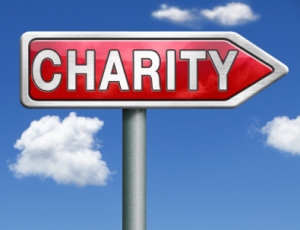 As I was driving home from the office tonight, a conversation on NPR got me thinking. The participants in the discussion clearly assumed that conservatives are less generous than liberals. They recited the reasons why conservatives opposed certain legislative initiatives as if they had the blue print to the conservative mind and heart…. , but did they?
As I was driving home from the office tonight, a conversation on NPR got me thinking. The participants in the discussion clearly assumed that conservatives are less generous than liberals. They recited the reasons why conservatives opposed certain legislative initiatives as if they had the blue print to the conservative mind and heart…. , but did they?
I decided to research the matter as best I could. This is what I found:
The first thing I found was from the Democratic Underground. Based on a study done in 2008 by the Internal Revenue Service of taxpayers throughout the country, The Chronicle of Philanthropy reported, “The eight states where residents gave the highest share of income to charity went for John McCain in 2008. The seven-lowest ranking states supported Barack Obama.” The middle class earners (making $50,000-$75,000) were more generous than those making more than $100,000. The more deeply religious areas of the country were more generous than the less religious areas of the country.
George Will, of course, cites the Brooks Study. He points out that Brooks is a self-labelled independent and was surprised by the data, so surprised that he initially thought it was faulty. Among the findings were these: 1) “Although liberal families’ incomes average 6 percent higher than those of conservative families, conservative-headed households give, on average, 30 percent more to charity than the average liberal-headed household ($1,600 per year vs. $1,227)”; 2) “Bush carried 24 of the 25 states where charitable giving was above average”; 3) “People who reject the idea that “government has a responsibility to reduce income inequality” give an average of four times more than people who accept that proposition”; 4) “America is largely divided between religious givers and secular nongivers, and the former are disproportionately conservative. One demonstration that religion is a strong determinant of charitable behavior is that the least charitable cohort is a relatively small one — secular conservatives”; 5) Democrats represent a majority of the wealthiest congressional districts, and half of America’s richest households live in states where both senators are Democrats”; 6) “Vice President Al Gore’s charitable contributions, as a percentage of his income, were below the national average: He gave 0.2 percent of his family income, one-seventh of the average for donating households. But Gore “gave at the office.” By using public office to give other peoples’ money to government programs, he was being charitable, as liberals increasingly, and conveniently, understand that word.”
From the freerepublic.com citing John Stossel – all but one of the top 25 charitable states voted Republican in the 2004 election; and Stossel noted, “Conservatives are even 18 percent more likely to give blood.” Quoting Professor Arthur Brooks of Syracuse University, author of the 2007 book Who Really Cares, “When you look at the data, it turns out that conservatives give about 30 percent more. And incidentally, conservative-headed families make slightly less money; “and people who believe it’s the government’s job to make incomes more equal, are far less likely to give their money away.”
From the New York Times, in an article by self-described liberal, Nicholas D. Kristoff, he says, “Liberals show tremendous compassion in pushing for generous government spending to help the neediest people at home and abroad. Yet when it comes to individual contributions to charitable causes, liberals are cheapskates.” A Google study revealed that conservatives give almost double what liberals give in proportion to their income. Kristoff says, “It’s true that religion is the essential reason conservatives give more, and religious liberals are as generous as religious conservatives. Among the stingiest of the stingy are secular conservatives”; and “if measuring by the percentage of income given, conservatives are more generous than liberals even to secular causes.” And another bomb: “liberal donations frequently sustain art museums, symphonies, schools and universities that cater to the well-off. (It’s great to support the arts and education, but they’re not the same as charity for the needy. And some research suggests that donations to education actually increase inequality because they go mostly to elite institutions attended by the wealthy.)” Finally, “People in red states are considerably more likely to volunteer for good causes, and conservatives give blood more often. If liberals and moderates gave blood as often as conservatives, Mr. Brooks said, the American blood supply would increase by 45 percent.”
In going through two pages of responses to my query on Google (who gives more to charity, Democrats or Republicans), I begin to come across commentaries on the same studies over and over. So I stopped. There were some pieces calling the studies into question, suggesting reasons for the differences, observing that religious people tend to give to churches and secular people tend to consider their tax money their giving and noting studies by several universities suggesting that the purpose for the giving triggers more giving alternately for conservatives or liberals, depending on the expressed purpose.
In the end, and without doing any independent research, it seems that Republicans, and conservatives, especially religious conservatives, give more to charity – though religious liberals are also liberal in their giving; while secular conservatives are the least charitable. According to the assumptions clearly couched in the discussion I heard, one would think that all Republicans are secular conservatives; but secular conservatives also had the smallest numbers of the groups studied. I have no way of confirming the data independently, but I am satisfied, at least, that the assumptions were incorrect. Republicans/conservatives are not less charitable than Democrats/liberals (thought they may be much less adept in conveying their charitable inclinations, or at least are less public about their charity); if anything they are more charitable.